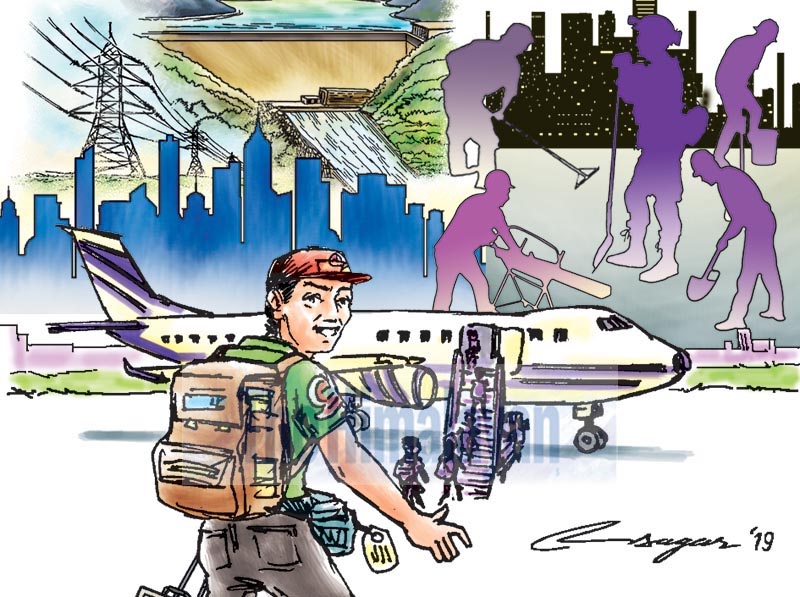Labour migration: Let’s manage and regulate it
It is essential that the migrants have access to full and correct information at the time of their departure about their pay, working conditions abroad and the time when they are to return home
Labour migration refers to the cross-border movement of citizens for the purpose of employment in a foreign country. Presently, more than half of all Nepali households have at least one member abroad. As a result, Nepal is characterised as a country with a remittance economy. The labour migration is due to lack of employment opportunities at home, poverty, economic hardships, political unrest and insecurity. However, labour migration has been a historic process, and so it isn’t wrong or negative in itself, but it has started to create ill effects due to its unmanaged and unregulated nature.
To understand the complexity of migration, it is crucial to first understand the various phases of migration and the loopholes in them, which give the recruitment agencies a space to involve in exploiting these people. It is essential that the migrants have access to full and correct information at the time of their departure about their pay, working conditions abroad and the time when they are to return home. For this, the recruitment agencies are legally obliged to ensure that the migrant workers undergo pre-departure orientation, and by law workers must have a contract before they leave Nepal. However, these provisions are limited only to paper. Alongside the role of the agencies comes the role of the government, which should have involved itself in implementing the law and a proper record system of the migrants leaving the country in search of a better livelihood. However, the government is concerned only about the flow of money, not how it has been generated.
To begin with, the first challenge that the migrant workers face is literacy. Due to illiteracy, the people are unemployed, leading them to a state of poverty. Such poverty compels them to resort to foreign labour migration. These poor and illiterate workers are easily lured by the agencies, who make offers with wrong or incomplete information in the pre-departure phase. Once the workers depart, they get trapped and become victims of forced labour, human trafficking and other forms of exploitation. The manipulation and exploitation start in the rural areas, where people are uninformed about their rights, the role of such agencies in the migration process and the overall cycle of migration. In Nepal, efforts have been made to regulate and control labour migration through the Foreign Employment Act of 2007. The Ministry of Labour, Employment and Social Security and the Department of Foreign Employment are the state authorities responsible for regulating the activities of licensed recruiting agents. However, many travel undocumented and through hidden channels.
Nepal is a member of the International Labour Organisation, which sets international standards for labour to promote a decent work environment for every worker. Further, it has ratified the International Convention on the Protection of the Rights of All Migrant Workers and Members of Their Family, which further creates an obligation upon the country to act instantly for the protection of migrant workers. Despite these visible national and international efforts made by various entities and Nepal’s willingness to better the situation of foreign employment, there has been no visible improvement in the condition of Nepali workers abroad.
These skilled, unskilled or semi-skilled migrant workers are the same people on whom we rely for the realisation of the dream to make Nepal prosperous. Most of the Nepali workers who go abroad tend to work at construction sites or factories. The knowledge, skills and experience that they bring back home can be beneficial to us in many ways. For example, following the destructive earthquake of 2015, the government has joined hands with many organisations to carry out post-quake recovery projects. The Nepali workers who have experience working in construction abroad could be used at construction sites. Similarly, many upcoming hydropower projects could utilise these migrant workers. This way we can ensure the optimal utilisation of our human resource in development projects. Further, this will also contribute to our current government’s agenda of creating employment and reducing poverty.
Currently, more than 2.6 million Nepalis are working abroad. With proper regulation and control of foreign employment, and proper identification and protection of the migrant workers, Nepal could use this historic process of labour migration as value addition to its own process of development. However, in the current scenario, the brutal exploitation and even death of many Nepali migrant workers have led us to draw negative conclusions about foreign employment.
It is urgent for the government, international organisations, research agencies, civil society and anyone related to foreign employment to explore possible solutions and immediately come to action to protect the innocent migrant workers from exploitation. Even though Nepal has taken initiatives to improve the condition of the migrant workers, studies show that they are inefficient and inadequate. The living standard and health conditions of the workers abroad continue to be deplorable with an undesirable number of deaths. If the scenario of labour migration remains the same, the increasing number of deaths of Nepali workers will kill our dream to develop Nepal and make it a better place to live in.






